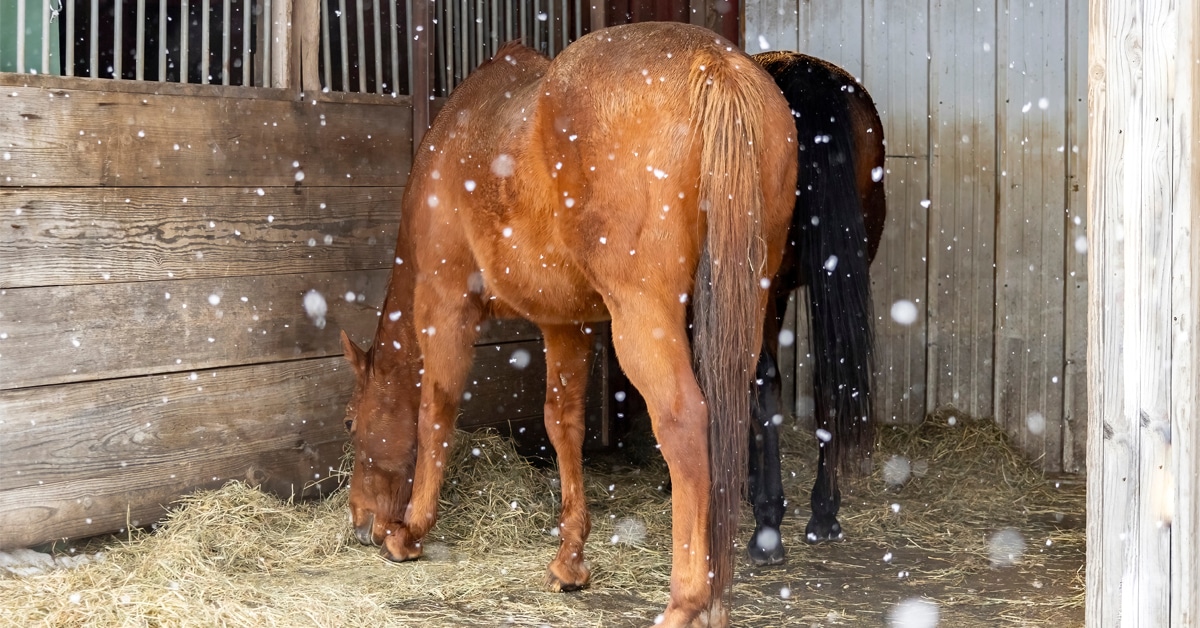Whether the result of limited turnout opportunities, illness recovery or other management practices, horses that must be stabled spend most of their day standing with little to no enrichment. This may lead to the expression of frustration behaviours and other abnormal behaviours. Following is a synopsis of two presentations from the International Society for Equitation Science conference entitled “A Good Life for Horses” presented by ISES in New Zealand in March 2024. One looked at various genres of music for enrichment; another at feeders, toys and mirrors.
Jazz, Country, Classical … or Nature Sounds?
Research in horses and other captive animals suggests that environmental enrichment may reduce the expression of frustration behaviours, such as pawing or kicking, and increase naturalistic behaviours, such as foraging. Sound is one form of environmental enrichment that has been associated with reduced abnormal behaviour expression.
As frustration and abnormal behaviours can be used as indicators of past or present welfare issues, sound was assessed for effectiveness as a tool to improve welfare in stabled horses. This study aimed to investigate if sound enrichment decreased frustration behaviour compared to the control periods (pre- and post-enrichment). A second objective investigated which sound was an optimal environmental enrichment tool to improve the welfare of stabled horses.
Behavioural observations were done on stabled warmblood horses for two weeks in one-hour periods twice a day (12:00-13:00, 16:00-17:00). The expression of several behaviours was measured, including foraging, frustration, social interactions, and stereotypic behaviours across five different sounds (Jazz, Country, Nature Sounds, Lullaby and Classical) against a Pre- and Post-Enrichment Control Day. Statistical analysis was performed comparing differences between days. Frustration behaviour expression was significantly increased when jazz music was played compared to the Pre-Enrichment Control Day. However, frustration behaviour expression was significantly decreased from pre-enrichment to post-enrichment, thus suggesting that sound enrichment may be a tool to improve the behavioural welfare of stabled horses.
Foraging behaviour was significantly increased when nature sounds were played compared to pre-enrichment, while a significant decrease in foraging behaviour was observed when jazz music was played.
These results suggest that sound enrichment may decrease the expression of frustration behaviour overall and that nature sounds may be the optimal form of sound enrichment to promote naturalistic behaviours such as foraging. Further research may assess the effectiveness of sound enrichment in reducing other equids’ expression of frustration behaviour.
Feeders, Toys and Mirrors
Enrichment seeks to encourage naturalistic activity budgets; however, effects on physiology are under-researched as well as how item type and provision time influences enrichment effects. This study analyzed physiology and behaviour of nine stalled Quarter Horses when provided hay feeder balls (High Country Plastics 16”), activity balls (Horsemen’s Pride 25”), and mirrors (24”x24”) to better understand effects on welfare.

Enrichment was removed between observations and during five-day washout periods between trials. Heart and respiration rate were recorded during observations approximately every 21 seconds through Nightwatch® Smart Halters™; behaviours were scored via video recordings in BORIS using focal instantaneous scan sampling at 30-second intervals.
Enrichment effects, item type, time-of-day, and possible interactions on each variable were tested. Findings included:
- Enrichment significantly increased heart rate from control, and the hay feeder showed the strongest effects among the enrichment items.
- No significant differences in respiration rate were recorded.
- Provision time did not affect heart rate within any treatments except the mirror, which was significantly lower in the evening compared to other times.
- Enrichment, regardless of type, encouraged more naturalistic activity budgets including significantly increased foraging and locomotion and significantly decreased standing alert, standing rest, social interactions, and frustration behaviours.
While all items showed many effects and appeared to be effective enrichments, significance varied among individual treatments, suggesting item type may affect different behaviours. The hay feeder’s activity budget more closely resembled that of wild horses, suggesting it may more effectively fulfill overall behavioural needs. Effects occurred throughout the day, with larger differences from control at noon and afternoon, compared to morning and evening; so owners should prioritize giving enrichment outside routine meal provision times.
In summary, providing enrichment positively effects physiology and behaviour and may improve emotional states, behavioural needs, health, and overall welfare of stalled horses. Enrichment increased heart rate, grazing and movement, and decreased standing, social and frustration behaviours. Effects were stronger during midday. All items were effective, though hay feeder had stronger effects, and may be provided to improve mood, behaviour, health, and welfare.
Further studies with larger sample size are recommended to explore different items, management, and long-term effects.
~ with files from International Equitation Science Conference
The Latest









